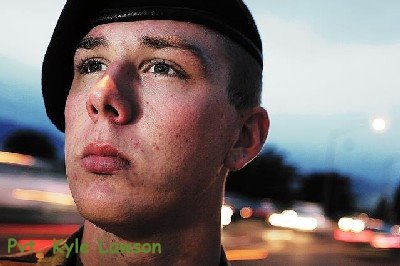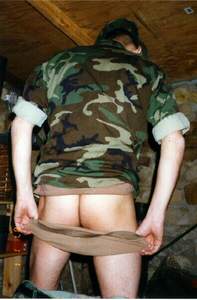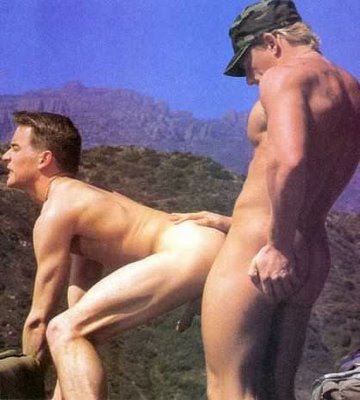 SIERRA VISTA, ARIZONA - Fear is keeping Pvt. Kyle Lawson awake at night — not of the enemy, but of his fellow soldiers.
SIERRA VISTA, ARIZONA - Fear is keeping Pvt. Kyle Lawson awake at night — not of the enemy, but of his fellow soldiers.For weeks, the 19-year-old Tucson native has been sleeping on a cot in his drill sergeant's office to protect him from further attacks because he is gay.
He's already had his nose broken — and says he also was threatened with a knife — after a friend let Lawson's secret slip at a party attended by members of the 309th Military Intelligence Battalion, a training unit at Fort Huachuca 75 miles southeast of Tucson.
Lawson now feels he has no choice but to leave the military and has requested a discharge. He was training to be an Army interrogator, a high-demand job in the age of terrorism.
"I can't keep living a lie. It's not safe for me here," said Lawson, who is described by friends and family as smart, moral and hardworking — qualities the Army says it values in soldiers.
Critics of the Pentagon's Don't Ask, Don't Tell policy say Lawson is one of hundreds of homosexuals harassed or assaulted each year, and say his story is a telling example of what's wrong with the ban on openly gay troops.
"I can't deny who I am"
Lawson was punched in the face by a fellow 309th soldier at the off-post party on Oct. 29, according to a police report of the incident.
The soldier told police Lawson made sexually suggestive remarks. Sierra Vista police Officer Darryl Scott, who investigated and laid a charge of felony aggravated assault, said in an interview that "there was no provocation."
The Army chose not to prosecute the charge, for reasons fort officials say they are not at liberty to explain.
A week after the first attack, Lawson said a second soldier threatened him with a knife outside a barracks as word spread about his sexual orientation.
Lawson said the soldiers who accosted him received little punishment from the Army. Fort Huachuca officials say neither case was mishandled.
Nearly 10,000 gays and lesbians — at least 63 from Southern Arizona bases — have been discharged under the rule that forces them into the closet.
A move is afoot to repeal the 12-year-old policy, with a bill backed by 100 federal lawmakers from both parties, including Southern Arizona Rep. Jim Kolbe, the only openly gay Republican in Congress.
But change will not come soon enough for Lawson, who, despite his woes, wishes he could stay in uniform. Most fellow soldiers have been supportive and sympathetic, he said.
"But I can't deny who I am anymore. I thought I could do it, but I can't," said Lawson, who said he agreed to an interview so the public can see how the policy affects people.
Mom fears for son's life

Striding down a sidewalk near the fort's main gate, Lawson looks as if he stepped off a recruiting poster.
A blond buzz cut peeks from beneath his black Army beret. Camouflage covers shoulders squared by endless push-ups.
His 6-foot-2-inch frame is arrow straight, hands tucked at his sides as if each fist is gripping a roll of quarters — just the way troops are trained to hold their hands while in uniform.
Before joining the Army — before admitting to himself that he was gay — Lawson was a teen preacher at a Baptist church in conservative southern Missouri, where he went to high school after moving from Tucson. His church's disapproval of homosexuality caused him such angst he tried dating girls and willing himself to feel attracted to them, he said. It didn't work.
Rebekah Fitzgerald, Lawson's English teacher and debate team coach at Reeds Spring High School in Missouri, said Lawson was "very discreet" about his sexual orientation, only confiding it to her after graduation last May.
Sheila Lawson, 42, said she hadn't a clue about her son's orientation until he called her from Fort Huachuca after his nose was broken and told her why he'd been attacked.
Since then, "I've been crying myself to sleep," she said. "He told me, 'Mom, I love the Army so much. I don't want to get out.' But I'm afraid for his life."
Fort took "appropriate action"
Before heading to boot camp, Lawson said he leveled with his recruiter, who told him "everything would be fine" as long as he stayed in the closet.
His case is not unusual, say those who help such troops. Beatings, taunting — and occasionally, murders — are fueled by the policy that makes gays hide, they say.
Despite a Pentagon push in 2000 to prevent gay-bashing — spurred by the slaying of a gay soldier at Fort Campbell, Ky. — more than 900 homosexual troops were verbally or physically harassed last year, according to the Service Members' Legal Defense Network in Washington, D.C.
Don't Ask, Don't Tell promotes ill will by stigmatizing homosexuality, said Steve Ralls, spokesman for the group.
"When the military as an institution can discriminate against you, what message does that send to your co-workers about how they can treat you?" he asked.
The military does not do enough to punish personnel who harass or attack gay colleagues, Ralls said.
In Lawson's case, police charged his alleged attacker with a Class 3 felony aggravated assault — a charge that draws an average 3 1/2 years in prison upon conviction in Arizona, more if a judge finds the crime was hate-based.
Lawson told police that the soldier who broke his nose used a profane anti-gay slur.
Fort Huachuca requested control of the criminal case — common when soldiers are charged by civilian police — but didn't prosecute.
Lawson said as far as he knows, his attacker was punished by losing some privileges, such as having his weekend pass revoked.
Fort Huachuca spokeswoman Tanja Linton said that although the Army did not take the case to court, commanders took "appropriate action." She would not say what action was taken, citing federal privacy laws.
Lawson's claim that he was threatened with a knife was not substantiated, so no action was needed, Linton said. However, out of concern for Lawson, he was told to sleep on a cot under his drill sergeant's watch after the knife report, she said.
She said the Army is satisfied that "the soldiers involved did not harbor prejudicial beliefs."
Still, Lawson's colleagues received "reinforcement training" stressing respect for each other, Linton said.
"Harassment of any type is not tolerated," she said.
Anti-gay sentiment common

A 2000 Pentagon study found anti-gay sentiment common in the military.
In the study, 80 percent of troops surveyed said they'd heard homosexual jokes or slurs in the past year; 37 percent said they'd seen or experienced anti-gay harassment.
But attitudes may be mellowing. In one poll this year of potential military recruits, 67 percent said openly gay troops would have "no effect" on their decisions to enlist. Other recent polls have found public support as high as 79 percent for allowing gays to serve openly, said Aaron Belkin, director of the Center for the Study of Sexual Minorities in the Military at the University of California at Santa Barbara.
Some say opening the closet would hurt recruiting and make life uncomfortable for many who already serve.
"The military is not like any other employer," said Elaine Donnelly of the Michigan-based Center for Military Readiness, which wants gays banned from the service and has fought to restrict the role of women.
Troops often live in close quarters with little privacy, creating "forced intimacy," Donnelly said.
"This is not a question of bigotry," she said. It's about "respect for personal modesty."
Not all polls support openly gay service, she noted. A recent Army Times poll found that 65 percent of respondents favor Don't Ask, Don't Tell.
Troops serve with foreign gays
Arguments like Donnelly's have surfaced in two dozen countries that legalized gay military service, said Belkin, who runs the research center on gays in the military. But the problems predicted never came to pass, he said.
U.S. troops in Iraq and elsewhere already serve with openly gay troops from Britain, Australia and other allied nations without incident, Belkin said.
Kolbe, the Southern Arizona congressman, said changes in military eligibility — such as including women or blacks — are always contentious at first but end up making the military better.
"I'm sure there were people who said to President Truman, when he signed the desegregation order, 'It will never work if you put a white soldier from Alabama in the barracks with a black soldier from Mississippi.' And today the military is a model of racial integration," he said.
He predicts that will eventually happen with gays.
One day, Kolbe said, "how well you do the job will be the only thing that matters."
from Arizona Daily Star
No comments:
Post a Comment